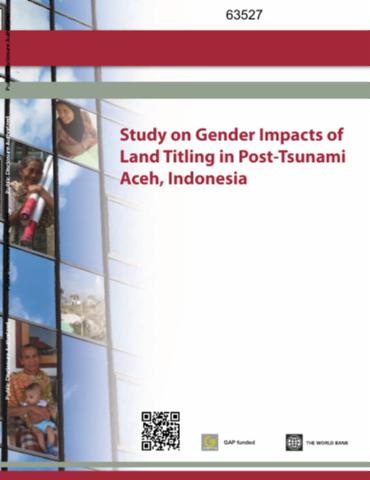Resource information
The tsunami that originated from the Indian Ocean in 2004 wreaked massive destruction, killing more than 130,000 people and displacing half a million individuals in Aceh, Indonesia. More than 800 kilometers of coastline was affected, and close to 53,795 land parcels were destroyed. The land administration system sustained significant damage because documentation of land ownership was washed away along with people's houses and other possessions in the affected communities. Physical boundary markers, including trees and fences, also disappeared. An additionally, close to one-third of the land office personnel perished. When the disaster struck, Aceh was reeling from three decades of civil strife. Five years later, in 2009, the province was still in the process of recovery not only from the devastation of the tsunami but also from years of unrest. The premise of this research study is that the gender aspects of women's access to land and property rights cannot be understood solely as an administrative or procedural issue, but should be considered a part of the broader social and cultural dimensions. These dimensions need to be understood in relation to development opportunities, constraints, and risks facing women and affecting their ability to participate in the process of reconstruction and development. Understanding the macro social and institutional processes is essential to influencing and supporting changes to enhance gender equity on land and property rights. The results of this study need to be appreciated within the following limitations: (a) it is affected by the absence of baseline information and gender-disaggregated data on land; (b) the scope of this study is limited to land and property rights only; and (c) by the time this study commenced, the Reconstruction of Aceh Land Administration System Project (RALAS) Grant had closed, and therefore the study served mainly to assess and document the experiences and lessons learned.


